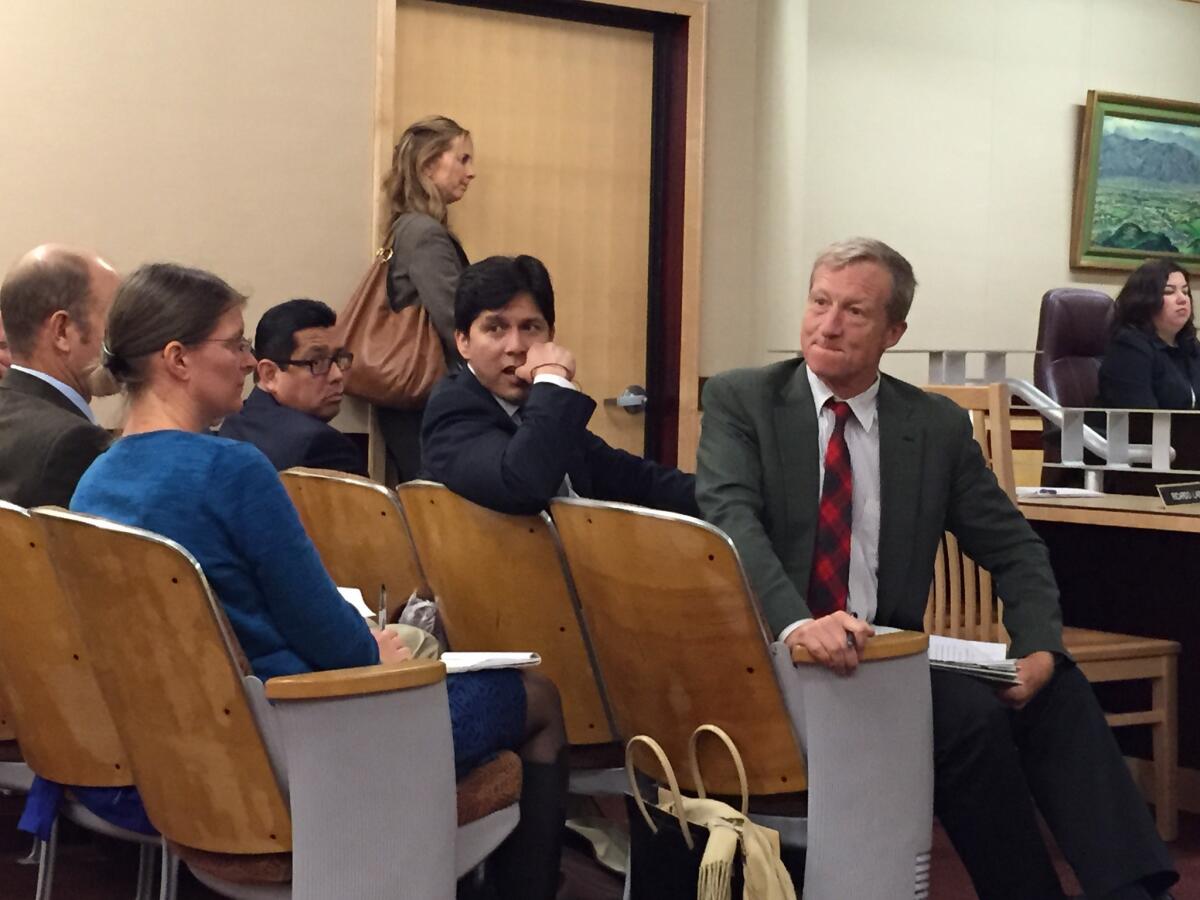Billionaire activist Tom Steyer testifies for sweeping climate bill

A far-ranging climate change measure cleared its first legislative hurdle Tuesday, as billionaire environmental benefactor Tom Steyer appeared at the Capitol to trumpet the bill’s economic benefits.
The measure, by Sens. Kevin De Leon (D-Los Angeles) and Mark Leno (D-San Francisco), is the most complex of the four pieces of climate change legislation introduced by Senate Democrats and it contains some of the most far-reaching objectives set by Gov. Jerry Brown in his inaugural address in January.
Steyer, who sat alongside De Leon at the Senate energy committee hearing, said the sweeping proposal “dramatically reshapes California’s economy and breaks the stranglehold of fossil fuels to the benefit of all Californians.”
The former hedge fund manager made an economic case for the climate change measure, arguing that if the state is an early adopter of renewable energy, “the rest of the world will have to follow us,” stating forcefully that “this is good for California jobs.”
Critics of the bill also made jobs a focal point. Sen. Mike Morrell (R-Rancho Cucamonga) challenged Steyer on why business groups such as the California Chamber of Commerce opposed the measure.
“You say this is going to create jobs, yet these organizations with millions of employees under them, with proven decades of track records, say this is a job killer,” Morrell said.
The bill would require California to reduce by half the amount of gasoline used for transportation. The target could be reached by increasing fuel efficiency, expanding the availability of alternative fuels and reducing the number of miles driven by residents.
Oil companies represented by the Western States Petroleum Assn. have said the proposal would be too difficult to fulfill and raise costs for California drivers.
The second part of the bill would require a 50% increase in energy efficiency in existing buildings, which use more electricity because they were constructed to outdated standards.
Lastly, the bill, SB 350, would require California to generate 50% of its electricity from such renewable sources as wind and solar by 2030, an increase from the current 33% target set for 2020.
This provision has been greeted skeptically by utility companies even though they are on track to hit the 2020 goal. Also, experts say the electrical grid would require significant upgrades to be able to accommodate the potential influx of renewable energy, which is more difficult to manage than power plants that burn fossil fuel.
Steyer, a prolific funder of Democratic candidates and who briefly considered his own U.S. Senate bid, has become a target for sharp criticism from foes in the oil and gas industry, as well as the Republican Party. But he said he was unconcerned his increasingly public persona could serve as a distraction from the bill.
“There’s always a temptation to think that being straightforward and drawing fire from people who disagree with you can be a negative,” Steyer said in an interview. “But I’ve never thought that telling the truth in an open, transparent way is a negative.”
Follow @melmason for more on California government and politics.
More to Read
Sign up for Essential California
The most important California stories and recommendations in your inbox every morning.
You may occasionally receive promotional content from the Los Angeles Times.












